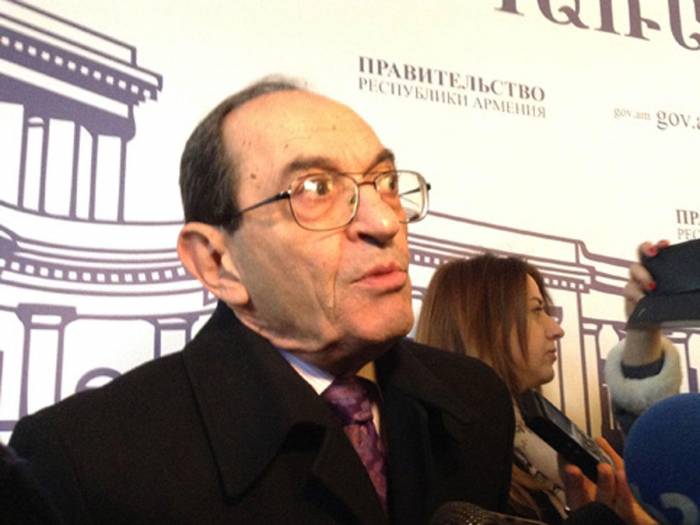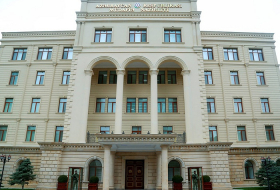So, let’s get acquainted with the speech of this politician, for whom it is high time to be nominated for the Nobel Prize in physiology or medicine.
“I am surprised at the excitement [around the issue],” he said. “It is obvious that it is impossible to achieve any progress without participation of the main party of the conflict [did he really mean Nagorno-Karabakh?]. The non-participation of Nagorno-Karabakh is due to the resistance of Azerbaijan. On the other hand, the [OSCE Minsk Group] co-chairs are well aware that Armenia cannot negotiate on behalf of Nagorno-Karabakh.”
Shavarsh Kocharyan was sharing with reporters a revelation that apparently visited him in a dream, saying the “three countries” should work together for a peaceful resolution.
Is there anything surprising in this? Indeed there is! Kocharyan’s statement is truly a sensation, as it calls into question the essence of the negotiation process of the last two decades.
God knows what section of biology Kocharyan was thinking of when talking with reporters, but he should have read at least three times what he said.
The first question: If Armenia cannot negotiate on behalf of Nagorno-Karabakh, then excuse me, what the hell it has been trying to do over the past years? Why there are statements about Nagorno-Karabakh from various Armenian politicians and functionaries? Kocharyan, apparently, either decided to pretend to be a fool or he makes a fool of readers and listeners.
Absolutely everything that happens in the Nagorno-Karabakh region is controlled directly from Armenia. The Nagorno-Karabakh region has no statehood. There are no internationally recognized political institutions. It does not even have its own phone code. And, please, do not try to draw a parallel between Armenia and Kazakhstan or Canada. They are not the same. Conscripts from Armenia serve and die in the Nagorno-Karabakh region; weapons appear in the region because Armenia buys them from Russia; international communication is realized via Armenia; the interests of the separatist regime are expressed by the politicians from Armenia. But Kocharyan suddenly begins to speak openly and understands that Yerevan cannot speak on behalf of Nagorno-Karabakh.
Well, in fact the politician-geneticist is right. Armenia cannot and should not speak on behalf of Nagorno-Karabakh, because Nagorno-Karabakh is Azerbaijan’s territory and it was a political entity within the Azerbaijan Soviet Socialist Republic. But that was necessary to talk and think about in 1988, when politicians in Yerevan promoted the idea of miatsum (Armenian anschluss).
The second question: Which three countries are meant by Kocharyan? Azerbaijan, Armenia and …? Is it really Nagorno-Karabakh? But wait a minute. Mr. Geneticist was apparently not reminded that Nagorno-Karabakh is not recognized by any country in the world. After all, even Armenia itself has not recognized the "independence" of Nagorno-Karabakh! I find it strange when a person with a mathematical education makes an official statement, calling as a country a region, which hasn’t been recognized as a country by anyone. However, Armenian politicians are suffering for years from this delusion.
The third question: If Armenia cannot speak at the talks on behalf of Nagorno-Karabakh, why did it take part in the development of political decisions on the conflict, which, incidentally, led to the resignation of the government in 1997-1998? For 20 years, Armenia has been making political decisions on Karabakh. And how come this has happened if Nagorno-Karabakh is a truly “independent political entity”?
It is evident that the “independence” of Nagorno-Karabakh is nothing but an attempt to separate the Nagorno-Karabakh conflict from the image of Armenia. They say that Armenia is not involved in the conflict, and it is not Yerevan that has committed acts of aggression against Azerbaijan.
On the other hand, even if we assume that Armenian politicians are sincere in their desire to see representatives of the separatist regime at the negotiating table, it is not clear why they believe that only Armenians should and can speak on behalf of Nagorno-Karabakh. What about the millions of Azerbaijanis expelled from their own lands?
Why did Yerevan think that Nagorno-Karabakh should be purely an Armenian political entity?
After all, the current population of Nagorno-Karabakh is ordinary Armenians, who are not a separate people who can claim for a right to self-determination. If Armenian politicians think the notion of the nation is identical with the concept of the population, then why does not the “people of Karabakh” include Azerbaijanis living there?
Answers to all these questions can be found in the trivial truth that "independence" of Nagorno-Karabakh is a secondary factor in the Nagorno-Karabakh conflict.
The war was staged by Armenian politicians, whose true motive from the very beginning was to annex the Karabakh territory to Armenia. They still wish this. However, the political situation has changed: what was shouted at the Yerevan rallies in 1988 is not voiced at international arena, as Armenia will not be understood. That is why, tricky genetics, mathematics engineers and other specialists decide to come up with a convenient formulation – “struggle for independence”.
All these formulations are extremely convenient to “feed” internal audience. However, as British political analyst Thomas de Waal noted in his article, Armenia’s Revolution and the Karabakh Conflict, “a moribund peace process is in need of reinvigorating. But Armenia’s new leaders need to be careful how they use the legitimacy they have won from the street. The Karabakh negotiating process is a delicate structure. Its collapse would point only one way, toward new conflict.”
Trend
More about: #Armenia













-1747837442.jpg&h=190&w=280&zc=1&q=100)


































